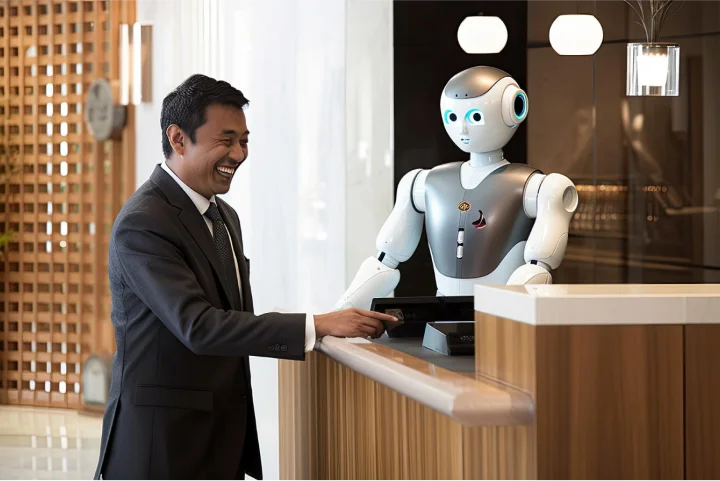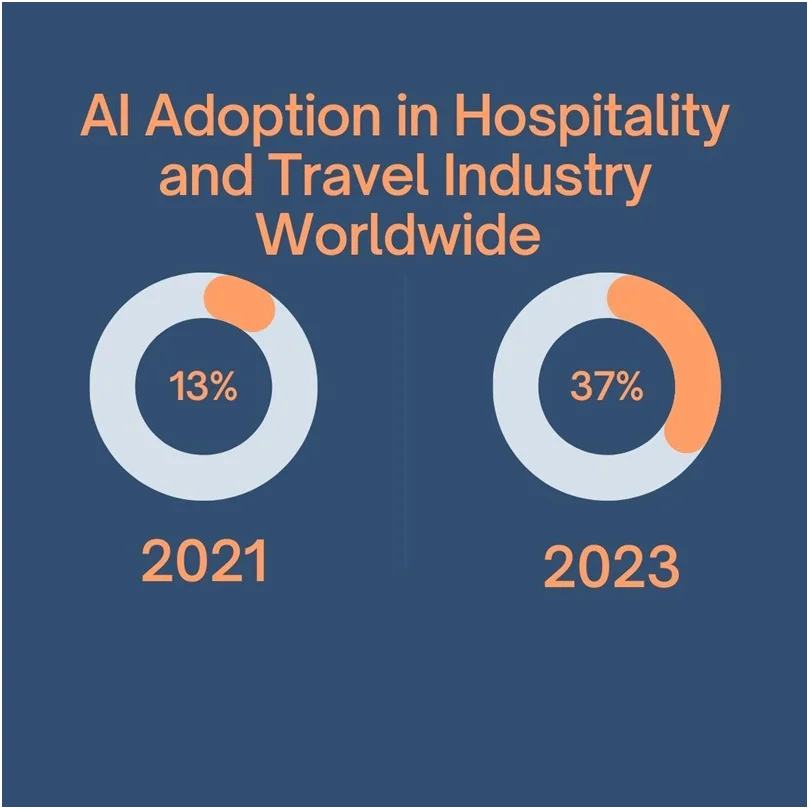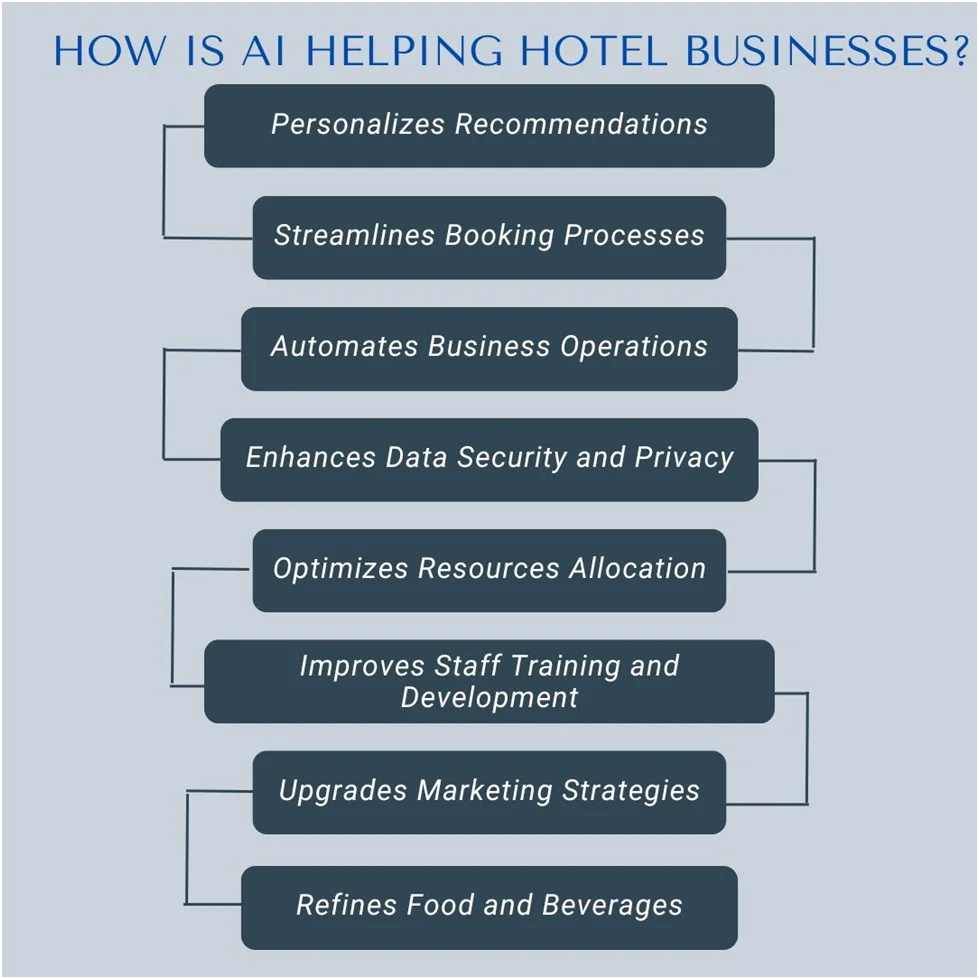
Imagine entering a hotel that provides services exactly tailored to your preferences. For example, the moment you step in, you are greeted by name, and the lighting, music, and temperature are adjusted as desired. Don’t be surprised. Hoteliers can make this possible with the help of AI.
AI is here to change the game of hotel customer experience.
But before learning in-depth how AI is revolutionizing the hotel customer service experience, let’s review basic information about AI and the different approaches being used in the hotel industry.
Table of Contents
What is AI?
Artificial Intelligence – the full form of AI- is a set of technologies enabling machines to think, act, and learn like humans. AI integrated into systems allows task automation without human intervention. These AI-powered systems can perform tasks like analyzing data, recognizing speech, solving problems, understanding language, and even making decisions. Machine learning (ML), natural language processing(NLP), and robotics are some of the subsets of AI that help systems and machines learn from humans, data, and new information and complete tasks on their own.
AI is being adopted in hospitality and travel industries worldwide at a greater scale. Let’s have a look at some facts relating to AI adoption in hospitality and travel-related businesses.

Types of AI Used for the Hotel Industry
In the hotel industry, generative AI and predictive AI are two types of AI that have the ability to bring transformation in the way they operate and engage with their customers. Let’s have a look at the details.
Generative AI in the Hotel Industry
With the help of Generative AI, hotels can create content for emails, advertising, websites, etc., based on prompts and available information. The content can be created with speed without any mistakes, which enables hotel businesses to attract and engage customers effectively. For example, ChatGPT development companies can help in creating tools that can generate content for emails, websites, and digital marketing quickly and flawlessly.
Predictive AI in the Hotel Industry
Predictive AI allows hotel businesses to study historical data, and identify customer behavior patterns, and market conditions. Based on this data, it can predict future outcomes and help in making informed and smart decisions. For example, after studying buyers’ behavior in the past, AI-powered systems help hotels provide personalized recommendations to their new or potential customers and improve their engagement.
Therefore, AI-powered tools have improved every aspect of the hotel industry whether it is about effective marketing or prompt services. Let’s now move to knowing the different ways AI is enhancing customer service in the hotel industry, ultimately setting new standards and generating more revenue.
Related Read: What is SaaS software? A Complete Guide
Role of AI (Artificial Intelligence) in Enhancing Customer Service Experience in Hotel Industry
The role of AI in enhancing customer service experience in the hotel industry is consistently evolving. AI-powered technologies like natural language processing (NLP), machine learning, deep learning, robotics, and speech recognition have the potential to personalize communication, interactions, and experiences, streamline operations, and analyze data accurately, ultimately leading to better customer experiences. As AI continues to transform the hospitality sector, businesses must also consider Budget Planning for AI & Blockchain in 2025 to ensure seamless integration and maximize the benefits of these advanced technologies. AI-powered tools are playing a vital role in enhancing the customer service experience in the hotel industry.
But how? Let’s examine some exciting ways in which AI is helping hotel businesses cater to and fulfill the demands of modern tourists and travelers excellently.

Let’s elaborate on all the above aspects:
Personalizes Recommendations
Providing personalized recommendations to guests is the key to enhancing their satisfaction. AI tools help in analyzing a huge amount of data and create guest profiles depending on their preferences, behavior, and past interactions with the hotel staff and authorities. This helps hotel businesses to offer personalized recommendations for dining options, discount coupons, local attractions, and more.
Streamlines Booking Processes
A systematic approach to bookings is essential for every hotel business. AI helps hotel businesses streamline booking processes on their websites and mobile applications. AI development companies are helping hotel businesses integrate voice search, chatbots, and many more modern facilities on their digital platforms to make the booking process extremely user-friendly. This ensures hotels capture more bookings from their audiences and improve revenue generation.
Automates Business Operations
AI is helping hotels to automate entire business operations, including routine tasks like check-ins and check-outs, room service requests, booking inquiries, and more. For example, AI-powered kiosks can speed up the check-in process, which enables guests to avoid long queues and enter their rooms as soon as they arrive at the hotel property. Also, AI chatbots and virtual assistants can answer customer queries 24/7. This helps enhance customer experiences and improve business reputation.
Enhances Data Security and Privacy
Security and privacy are basic requirements in the hotel business. Several people from different locations visit the property. There are now AI-powered surveillance systems available with extraordinary capabilities for monitoring suspicious activities and unusual behavior. These systems can also detect security threats on time and keep staff alert on a real-time basis. This allows hotel authorities to prevent incidents that can harm the guests and people working in the hotel. Also, AI-powered systems can help detect malware activities and fix potential threats in hotel digital systems. This keeps guest information safe and maintains the privacy of confidential information.
Optimizes Resources Allocation
Optimizing resources based on priorities in a hotel business is crucial. Sometimes, if housekeeping departments are running low on resources, you need to assign resources from other departments, like laundry and kitchen cleaning, to clean rooms and complete check-ins on time. Similarly, there are many other quick decisions you need to make about resource allocation, which can help you improve productivity and provide better and more timely services to your customers. AI tools can help businesses identify potential bottlenecks, predict future resource requirements, and optimize resource utilization based on the available real-time information. Hotels using AI tools can optimize resource management effectively, which leads to cost savings and improved efficiency across all departments.
Improves Staff Training and Development
We all know that a hotel cannot be successful without well-trained staff. Only a well-trained staff can deliver excellent guest experiences. Using AI-powered training platforms; hotel businesses can conduct personalized learning programs and train their employees effectively. These training platforms also examine every aspect of employee’s strengths, weaknesses, and performance and, based on that, design customized training programs that can benefit your hotel business.
Upgrades Marketing Strategies
Applying effective marketing and promotion strategies is critical for any hotel business to survive and grow. AI-enabled marketing tools help hotel businesses analyze their customer behavior and preferences and design robust marketing strategies accordingly. These targeted marketing campaigns are likely to stay relevant to the guests’ preferences and requirements and lead to higher conversions. Also, successful marketing strategies help hotel businesses to make their online presence strong and engage with their social media audiences more effectively.
Refines Food and Beverages
The quality of food and beverages are the main reasons why travelers prefer a particular hotel. If you are providing a luxurious stay in your hotel but food and beverages don’t match your customers’ expectations, you might lose sales. AI-powered tools can collect feedback from your guests relating to food and beverages and help you improve the quality of your servings. Many of your guests may be following some dietary restrictions, and if you have proper know-how about their dietary preferences, you can serve food and beverages as per their choices and ensure that they leave the hotel happily and satisfied. Also, these systems can help you optimize your inventory, ensuring required stock and reduced wastage.
So, these are some of the exciting ways AI is helping hotels revolutionize customer service experiences. Let’s now have a look at some real case studies of modern hotels that have already adopted AI and are benefitting from it.
Examples of Hotel Brands Implementing AI (Artificial Intelligence)
Hilton Hotels: Hilton has integrated AI-enabled chatbots and virtual assistants who respond to guest inquiries relating to booking and reservations and also provide personalized recommendations without human intervention.
Hyatt Hotels: Hyatt has been successful in reducing operational costs by $4.4 million annually by implementing AI-driven conversational interfaces in their contact centers. With this implementation, they were successfully able to improve call handling efficiency and delight their customers with quick and accurate responses.
Wyndham Hotels & Resorts: Wyndham has implemented an AI-powered platform that enables guests to self-check in and check out using a credit card and ID verification before their arrival. This has helped them prevent fraud and reduce wait times. This check-in and check-out can be done using web platforms or any mobile application.
Conclusion
Artificial Intelligence is everywhere throughout the journey of a guest in the hotel, from initial booking and check-in to post-stay follow-up. AI integration enables hotels to understand guests’ needs in a better way, respond promptly to those preferences, and serve them in a way that can delight them and win their loyalty. The strengths and potential of AI have helped hotel businesses to tailor guest experiences, identify future threats and issues, apply required security measures, and improvise operational and marketing strategies, ultimately modernizing customer service experiences that result in better revenue generation and growth.
If you are looking forward to implementing AI in your hotel business, you can go through this list of the top Artificial Intelligence development companies and select the best one that suits your requirements and budget.


